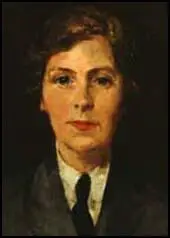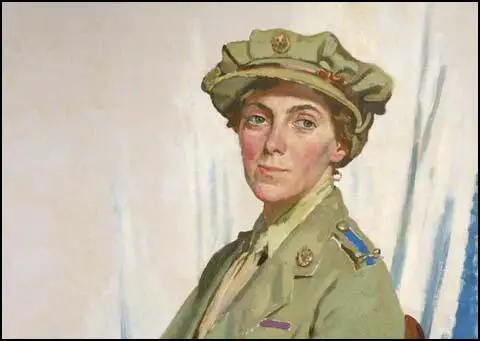Helen Gwynne-Vaughan

Helen Fraser was born into a Scottish aristocratic family on 21st January 1879. Educated at Cheltenham Ladies College her parents were shocked when she asked to study science at university. After obtaining a B.Sc. degree in Botany from King's College, London she carried out research into mycology.
In 1907 Fraser joined with Elizabeth Garrett Anderson to form the University of London Women's Suffrage Society. She also became a lecturer at Birkbeck College and eventually became Head of the Botany Department. In 1911 Helen married the palaeobotanist, Professor T. G. Gwynne-Vaughan.
On the outbreak of the First World War, Gwynne-Vaughan joined the Red Cross and became a VAD. This work was halted by the need to nurse her seriously ill husband. On the death of T. G. Gwynne-Vaughan in 1915, she returned to her voluntary war work.
In January 1917, the government announced the establishment of a new voluntary service, the Women's Auxiliary Army Corps (WAAC). The plan was for these women to serve as clerks, telephonists, waitresses, cooks, and as instructors in the use of gas masks. It was decided that women would not be allowed to hold commissions and so that those in charge were given the ranks of controller and administrator. Helen Gwynne-Vaughan was chosen for the important job as the WAAC's Chief Controller (Overseas).
After a critical report of the Women's Auxiliary Army Corps (WAAC) by Lady Margaret Rhondda, its commander, Violet Douglas-Pennant was dismissed. In September, 1918, Gwynne-Vaughan, who had gained a reputation as an efficient administrator in the WAAC, was asked by Sir William Weir, Secretary of State for Air, to take charge of the organization.

Gwynne-Vaughan was a great success as commander of the Women's Royal Air Force. Sir Sefton Brancker argued that "the WRAF was the best disciplined and best turned-out women's organization in the country." Gwynne-Vaughan's work was recognised in June, 1919, when she was awarded the Dame Commander of the Order of the British Empire (DBE). However, after the war it was decided to disband the WRAF and Gwynne-Vaughan left office in December, 1919.
Gwynne-Vaughan resumed her academic career and in 1922 published the well-received Fungi: Ascomycetes, Ustilaginales, Uredinales. Elected President of the British Mycological Society, she wrote a series of substantial papers in the 1920s and 1930s on the cytology of fungi.
Gwynne-Vaughan helped to form the WRAF Old Comrades Association and became its first president in March 1920. With war with Germany looking inevitable in the summer of 1939, Gwynne-Vaughan was asked to become head of the recently established Women's Auxiliary Air Force (WAAF). As she was now sixty she declined the offer and instead suggested Jane Trefusis-Forbes, the Director of the Auxiliary Territorial Services (ATS). However, she did agree to become Major-General of the ATS.
In 1941 Gwynne-Vaughan left the ATS and returned to Birkbeck College where she remained until her retirement in 1944.
Helen Gwynne-Vaughan was active in the Soldiers', Sailors' and Airmen's Families Association until just before her death on 26th August 1967.
Primary Sources
(1) In her book, Junior Leader, Helen Gwynne-Vaughan described being offered the post as head of the Women's Royal Air Force.
The Adjutant-General said he had an interesting proposal for me: would I like to be head of the Women's Royal Air Force? Since I could imagine no work more worth doing than the post I held, I said, "No thank you". He urged the advantages, till at last I asked whether this was by any chance an order. I learnt that it was.
(2) Sir Sefton Brancker, Air Ministry Master General of Personnel, speaking after the First World War.
By the end of the year the WRAF was the best disciplined and best turned-out women's organization in the country. This remarkable achievement was due to the keenness, efficiency and sound administration of Dame Helen Gwynne-Vaughan - it was nothing to do with me, except that I gave her wide powers and all the independence that was possible.

